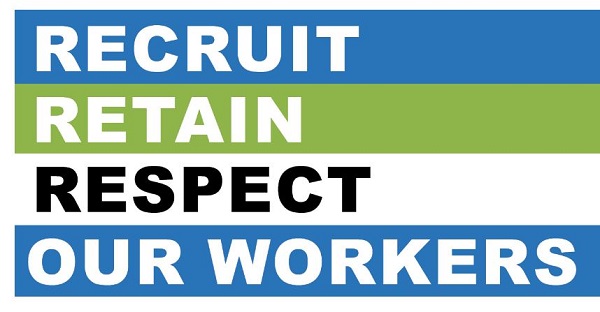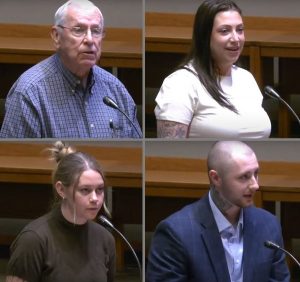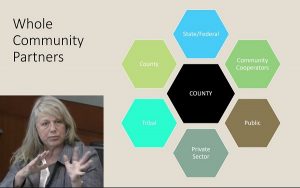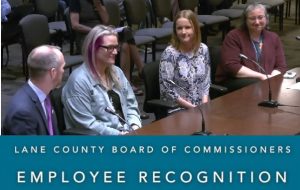Local nurses prepare for PeaceHealth strike Feb. 10, invite public support
13 min read
PeaceHealth hospice nurses and home health care nurses plan to go on strike starting Feb. 10.
Heather Herbert (Oregon Nurses Association): I am Heather Herbert and I am a hospice nurse with PeaceHealth, and I’m with the ONA. The reason that we’re going on strike is we just want to be treated the same as we’ve always been treated. We’re doing the same work. We’ve got the same skills. We have the same degree. We’re not asking for anything new. We just want it to be the same as it’s always been.
I got my associate’s at Lane (Community College) and then I got my bachelor’s at the University of Health and Science. I’ve worked at the hospital as a floor nurse, I’ve worked in the operating room; I worked on oncology at RiverBend and many of my friends moved from oncology to hospice, a great many of them. And I was in the operating room at that time and was missing patient care, and so I decided to take a job there and then ended up going full-time.
[00:01:08] There’s about 90 nurses between home health and hospice. There’s about 500 people in the community that we serve of all ages: People who are homebound and not able to go and get care to, like, a doctor’s office. So it’s either we go to them or they call 911 and go to the hospital.
[00:01:35] Kevin Mealy (Oregon Nurses Association): Nurses have been at the table with PeaceHealth since February 2023, so they’ve been negotiating for a year and their contract expired in April 2023. So they’ve been without a contract since then.
[00:01:50] They want the same respect as hospital nurses and ultimately the same pay that PeaceHealth agreed to with hospital nurses in August. But at the table, PeaceHealth has been repeatedly telling home care nurses they’re worth less than hospital nurses and less than other home care nurses throughout the region. And while the work is different, it’s certainly as challenging, if not more so than working in the hospital. So all home care nurses want is equal pay for equal work.
[00:02:24] This is the first time PeaceHealth has come to nurses saying that they’re worth less than their hospital counterparts. And other groups that have both home and hospital nurses like Providence also pay all those folks equally. This is the first time PeaceHealth has tried to change that. And what we know about home care nurses is not only do they work closely with their hospital counterparts, but their work keeps people out of the hospital, which saves patients money and saves PeaceHealth money.
[00:02:57] The most expensive place to get health care is in the emergency room. And by helping people heal at home, these nurses save patients money, they save PeaceHealth money, and they make sure that there is a hospital bed available when there are real emergencies happening to community members. So it’s really a win-win-win.
[00:03:17] With these lowball offers, PeaceHealth is already driving local nurses to leave. Almost a quarter of nurses at PeaceHealth Sacred Heart Home Care Services have already left. And another one-third plan to leave if PeaceHealth is unable to resolve this contract equitably.
[00:03:38] Heather Herbert: And those, that was a poll that was taken a while ago. My assumption is that they’re bigger numbers now. I know I’ve looked for other jobs. I’ve applied for other jobs. I know of other people who have.
[00:03:56] Kevin Mealy: And so that’s a huge loss to the community and we’re already seeing its impacts. Fewer nurses means delays in care.
[00:04:03] When someone gets sent home from the hospital and they require home services, but they’re not going to be able to care for themselves fully, or they’re not going to be able to get back to the hospital due to mobility issues or other health issues, what happens is then they’re ‘admitted’ to home care. So they’re provided this service and you’re trying to get folks in in a timely fashion. You need follow-up care for wound dressings, for continued PT.
[00:04:34] Usually those folks are admitted into home care services within two to three days after they leave the hospital. So the national average is ninety-five percent timely admissions. PeaceHealth average is falling. It’s below 50% now.
[00:04:48] So fewer nurses in home care means delays in care for patients, and that means patients are more likely to be readmitted to the hospital. So because PeaceHealth has dragged these contract negotiations out so long because they continue to disrespect nurses with these lowball offers, they’re losing nurses and their patients are losing access to the care they need.
[00:05:13] When people need care and don’t get it at home, they have to head into the hospital to get it, and that means everyone’s getting slower care. Everyone coming into the ER is now another person behind. And of course, patients aren’t getting the care they need, which is the most important piece of that equation.
[00:05:33] Heather Herbert: Not everybody can be on hospice. You have to qualify: You have to have two doctors who would agree and wouldn’t be surprised if someone died within six months due to disease process.
[00:05:46] And our job is to ease burden of symptoms from their disease process and just let a person’s body do what a person’s body is going to just naturally do, and teach families what might be happening, and then to plan around that so that they can have the best chapter in the last chapter of their life. And to just sit with people and help give them peace where there’s usually a lot of fear.
[00:06:17] We go into people’s homes multiple times a week and we’re there for years sometimes. And what I get to do is help somebody’s last wishes be honored.
[00:06:31] In the hospital setting, everything is about rules: ‘What are you going to do? How do you achieve a specific outcome? We want your blood sugar to be something. We want your blood pressure to be something.’ Where in hospice, we don’t care about those anymore. We get to say, ‘How do you feel? Do you feel good?’ Because you can have beautiful numbers on a piece of paper and feel bad. Or you can have terrible numbers and feel great.
[00:06:59] So if you feel bad, what can we do about it? And if you’re feeling good, what would you like your next experience to be? Do you have a goal that you’re working towards? Do you want to go on a trip? Do you want to take a walk? Do you want to just see a sunrise, hold somebody’s hand? Is their birthday coming up? Let’s celebrate it sooner. You might not get Christmas—let’s find a Santa Claus. You want ice cream for breakfast? Let’s do it! So giving people permission to celebrate life in ways that don’t always fit a mold.
[00:07:33] It’s a job that makes me a better person. Being able to share these spaces with people, it helps put perspective on my own life. I know it helps me to prioritize things. I will forgive easier. I will call my children a little more. Hold hugs tighter. Enjoy the sunrise. Tell people I love them. You don’t get the same reminders that life is precious in other jobs.
[00:08:05] We are loyal to our patients and striking is something that we really have struggled with, coming to this decision. There’s been a lot of tears and we’re going to be without pay during this time, so people are financially concerned as well.
[00:08:27] And there’s a lot of people who have big families and only one earner—medically-fragile children, elderly people who are supported by it. These are our families and we’re going on our second year without having a contract. And with people leaving and then we’re not able to get other nurses to apply and take their positions, so we are running at a deficit of nurses.
[00:08:56] And it used to be that if I had a patient who had a need, that I could call my scheduler and she would clear my schedule so I could be with that family for as long as I needed to, which is really important if a child is dying or if someone is in pain or they need a nurse in their house.
[00:09:18] Kevin Mealy: Of course, strike is a last resort. Nurses don’t want to leave their patients. They do this job because they love it and they want to give them the best care.
[00:09:28] We’re willing to meet with PeaceHealth anywhere, anytime. But since nurses filed the strike notice, PeaceHealth has repeatedly refused to meet with nurses and canceled a scheduled meeting we had with a federal mediator and nurses. So it’s refused to meet with nurses for nearly a month now, and that makes it hard to come to an agreement when you don’t have a willing partner.
[00:09:52] After nurses filed their original intent to strike, PeaceHealth responded by threatening to cut off nurses’ health insurance and to cut off health insurance for nurses’ family members who got that insurance through PeaceHealth.
[00:10:06] And threatening to cut off nurses’ health insurance for engaging in lawful, protected union activities like a strike does violate the National Labor Relations Act. So ONA has filed what’s called an unfair labor practice charge, but none of that is likely to be resolved before (Feb.) 10th (when the strike is scheduled to begin).
[00:10:27] Patients are already seeing so many delays and it will continue to get worse if they aren’t able to get the type of contract that allows them to retain the great nurses they already have and to recruit new nurses.
[00:10:42] This is a nursing specialty, so it takes a special type of person to do this type of care and you can’t pay them less. Nurses will simply say, ‘Well, I’ll go work in a hospital.’ With Heather, she’s helping families deal with the imminent loss. That’s not a job everyone can do. It takes a special kind of person to do this work. These nurses go out into the community with only the materials they have in their trunk and have to figure out how to make it work.
[00:11:12] So it is a very unique sort of workplace that brings its own challenges. During the ice storm, you still have to go out and see your patients, so you have to brave the roads. Even though nurses didn’t have power or heat in their own homes, they’re still going to homes who might not have power and heat on their own, and they’re finding ways to give them the care they need.
[00:11:33] Many of them come from hospital nursing backgrounds and they use all the skills they learned in the hospital and then they have to learn a lot more because it is such a unique environment. And it carries different risks: Just last year in Washington, we tragically saw a home health nurse killed by a family member. And so it is a risky job in some ways and carries unique challenges.
[00:12:00] Heather Herbert: And that I think was one of the biggest surprises that I had to realize is: Not every situation is safe, and, is my safety an issue? And I’ve experienced violence with police involved and arrests and drug use that’s happening there in the home. (It was actually a motel at that place.) We have to tell people to put their guns away and their knives. And you just go, ‘This could be unsafe.’
[00:12:33] And I never really asked that question as much in the hospital, where home nursing, community nursing, you’re really entering into the space of other people. And people live in dysfunction and have poor coping skills. And that was a big surprise. It was a big learning curve for me.
[00:12:55] Especially when you go into a home and they don’t actually have a floor or a working bathroom. No running water. People who don’t speak English. People who can’t read. People who lack dexterity. So how do you give medications to somebody when they have to draw them up or open up a pill box or read a pill box? How do you help?
[00:13:17] That’s one of the things that I enjoy is that problem solving, of: How do I teach families and people in a way that they are able to be successful at using the tools we have to offer?
[00:13:35] And not everybody is on board with hospice. Some people think we’re there to harm somebody, ’cause there’s a lot of fear with just hospice and dying brings up a lot for people.
[00:13:51] So you might have somebody traveling from out of state with a lot of emotion showing up. And it’s overwhelming ’cause it’s their whole life is changing. In addition to the grief that people have and this is their last moment, it means something.
[00:14:11] Death is something that’s going to happen to everybody. And during that time it can be stressful. Your body will fail and making decisions is hard. And you may not be able to speak for yourself. And so having these conversations with families and patients—especially if we have time—you can take something that is super, super stressful and make a plan so that you know how to function in a very stressful moment.
[00:14:46] And it gives you peace, it gives you something that you can do and allows for just the space to be present with your loved one as they’re dying.
[00:14:57] We talk a lot about medications, what to do if someone’s short of breath or in pain, symptom management. But some people will talk about what kind of music that they would like to be listening to, who is going to wash their body.
[00:15:16] People like to release things like butterflies or dandelion seeds or balloons. Sometimes people do, like, wish paper: You can write a thought or a wish or a memory of somebody, and then you crumple it in a certain way and then you can light that on fire and that floats. I’ve seen people release paper lanterns, like the Chinese lanterns. It’s a beautiful expression, just, it’s so peaceful and it just floats away.
[00:15:51] Sometimes people are afraid to wash the body after they’ve passed. And so I started washing their body and then as people see me, they feel more comfortable with it and then they can start participating and then I can back away and they can finish it.
[00:16:09] Then it becomes: What kind of clothes they’re going to wear? And if they’re wearing jewelry, or if somebody is an artist, do we bring their artwork in? If they’re a person who loves to do gardening and we can bring in some of their garden stuff. Kids are really good at planning parties, so working with the moms and dads of what that can look like too.
[00:16:35] That’s the culture that I fell in love with, is helping people who really need help and I can provide that. And now I worry that I won’t have the same space. I worry that the culture’s going to change just because you need staff, you need nurses in order to care for people.
[00:16:54] And that need is not going away. Oregon has one of the largest populations of elderly people. So our population of people who need hospice and need home care is growing.
[00:17:11] Kevin Mealy: We know that PeaceHealth CEO Liz Dunne got a $2 million increase in her salary in 2021. So in the midst of the pandemic, the CEO took a $2 million increase and PeaceHealth’s top executives enjoyed a 42% average annual increase of their salaries from 2017 through 2021.
[00:17:36] So just as a lot of workers were risking their lives and health to work during the pandemic. We saw a lot of folks who don’t come into the office at all and certainly don’t care for sick patients or work on the hospital floor or in people’s homes during the pandemic got big bonuses.
[00:17:57] And coming out of the pandemic, we’re seeing them act like home care nurses are worth less than other nurses, and we’re seeing PeaceHealth make severe cuts in the Eugene-Springfield area, University District being one of the biggest losses. PeaceHealth executives took big bonuses and then chose to cut Eugene’s only hospital. That’s going to leave a lot of people in the lurch and we’ll have long-term health effects in the community for years to come.
[00:18:25] And that’s not the only cut they’ve made. We know that during and after the pandemic, they’ve cut a number of jobs in Vancouver and in Eugene Springfield, they’ve closed clinics that are local. They’ve closed the pediatric, extra cardiology unit there locally as well as a sleep lab.
[00:18:43] They’ve been cutting health care left and right at the same time that they’re taking these big salary increases and telling nurses and others that they’re worth much, much less than what the CEO is making, but also less than what folks working at the other local home health agencies are making.
[00:19:01] Nurses aren’t asking for more, they’re just asking for the same treatment that PeaceHealth provides to all its other nurses in the area, and that they agreed to just in August, they signed off with a contract with the Sacred heart hospital nurses.
[00:19:16] The only question left is: Why can’t they be recognized for their work and given equal pay, which they’ve always been in the past?
[00:19:25] John Q: The public is invited to join the nurses on Feb. 10, and to join them on the picket line.
[00:19:32] Kevin Mealy: So the 10th at 10 a.m. will be the formal rally kickoff. The public’s invited to attend to hear from nurses about the issues at hand and how it affects everyone in our community, not just those currently receiving services.
[00:19:48] I think coming out of PeaceHealth shutting down University District, there is a renewed interest in what PeaceHealth is doing as the main provider of health care in this community, and what we need to do as community members to stand up and fight for the type of health care that we need, and that includes robust home care services.
[00:20:13] John Q: Heather Herbert and Kevin Mealy with the Oregon Nurses Association encourage you to: learn more at the website Respect Our Nurses.com, consider supporting the strike fund, and join nurses at a strike rally on Feb. 10 at 10 a.m.
Community members are invited to participate in the kickoff rally Saturday, Feb. 10 at 10 a.m. outside PeaceHealth’s Sacred Heart Home Care Services office, 123 International Way, Springfield.



